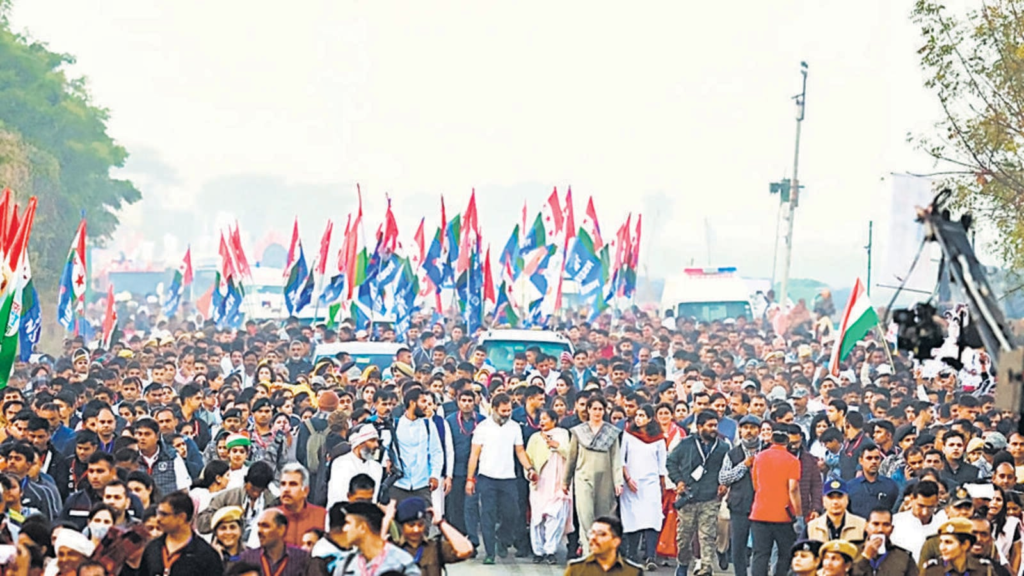Rahul Gandhi, a leading figure in Indian politics, is a key member of the Indian National Congress (INC), one of India’s oldest and most influential political parties. Born into the powerful Nehru-Gandhi family, Rahul Gandhi carries the legacy of three former Prime Ministers, including his great-grandfather Jawaharlal Nehru, grandmother Indira Gandhi, and father Rajiv Gandhi. Despite criticism and political challenges, he continues to be a central figure in the Congress party and national politics.
Early Life and Education

Rahul Gandhi was born on June 19, 1970, in New Delhi. He is the son of Rajiv Gandhi and Sonia Gandhi. Due to security concerns following the assassination of his grandmother Indira Gandhi, Rahul spent much of his early life away from the public eye. He studied at prestigious institutions such as Harvard University and Cambridge University, although his identity was kept secret at times for safety.
After completing his education, Rahul worked in London before returning to India in the early 2000s to enter public life. His decision to join politics was viewed as a natural move, given his family’s strong political background.
Political Career and Rise in Congress
Rahul Gandhi entered active politics in 2004, contesting and winning the parliamentary seat from Amethi in Uttar Pradesh, a Congress stronghold held by his family for decades. Since then, he has been re-elected multiple times, though he faced a defeat in Amethi during the 2019 general elections. However, he also contested and won from Wayanad in Kerala, keeping his presence alive in the Lok Sabha.
In 2007, he was appointed General Secretary of the Indian National Congress and later became the Vice President in 2013. His rise in the party has been both praised and criticized, with many attributing it to his family name rather than political experience.
In 2017, Rahul Gandhi officially took over as the President of the Indian National Congress, succeeding his mother Sonia Gandhi. His leadership came at a time when the party was struggling to maintain its influence, particularly after major defeats in the 2014 and 2019 general elections.
Major Political Campaigns and Bharat Jodo Yatra

Despite setbacks, Rahul Gandhi has remained active and vocal about key national issues. One of his most significant political moves in recent years has been the Bharat Jodo Yatra (Unite India March), launched in 2022. The yatra spanned over 3,500 kilometers, from Kanyakumari in the south to Kashmir in the north, aiming to connect with the common people and oppose the divisive politics of the ruling Bharatiya Janata Party (BJP).
The march helped Rahul Gandhi rebrand his image as a people’s leader, someone who is willing to walk across the country to hear the voices of farmers, workers, students, and marginalized communities. The yatra was widely covered in the media and sparked a new wave of support among Congress workers.
Views and Ideologies
Rahul Gandhi positions himself as a defender of democratic values, secularism, and the rights of India’s poor and middle class. He often speaks out on issues such as unemployment, inflation, farmers’ rights, and freedom of speech. He is also a sharp critic of Prime Minister Narendra Modi and the BJP’s policies, which he accuses of promoting authoritarianism and communalism.
One of his key concerns is the growing gap between the rich and the poor in India. He often highlights how big businesses are favored under the current government while small traders and farmers suffer. Rahul also emphasizes youth empowerment and education as tools for national development.
Criticism and Challenges
Rahul Gandhi has often been targeted by political opponents and the media for his style of leadership. Critics label him as inconsistent, detached from grassroots politics, and lacking the charisma of earlier leaders in his family. Terms like “Pappu” (a mocking nickname) have been used by trolls and rival parties to question his political maturity.
Despite this, Rahul has shown resilience. He has taken responsibility for electoral failures and even resigned as Congress President in 2019 after the party’s defeat. His decision was praised by some as a move of accountability, while others saw it as a leadership vacuum within the party.
The Congress party has also struggled with internal divisions and defections, making Rahul’s job as a unifying leader more difficult. Yet, many Congress supporters believe he represents the party’s core values and offers a much-needed alternative to the current political direction of the country.
The Road Ahead: 2024 and Beyond
As India approaches the 2024 general elections, Rahul Gandhi’s role becomes even more crucial. He is seen as one of the key leaders trying to build a united opposition against the BJP. Talks of alliances with regional parties and efforts to bring together anti-BJP forces are in progress, with Rahul playing a central part.
The outcome of the 2024 elections could shape not just the future of the Congress party but also Rahul Gandhi’s political legacy. Whether or not the Congress can revive its lost ground, Rahul Gandhi is likely to remain a key figure in Indian politics.
Conclusion
Rahul Gandhi’s journey in Indian politics has been filled with both admiration and criticism. While his political legacy is heavily influenced by his family background, his recent efforts show a more determined and mature approach to leadership. Whether he emerges as a true challenger to the ruling party or not, his presence continues to shape the narrative of Indian democracy.
Tags: Rahul Gandhi, Indian National Congress, Bharat Jodo Yatra, 2024 Elections, Indian Politics, Rahul Gandhi Congress, Rahul Gandhi Biography
Read More:- Best 10 Out Door Games For Kids











Leave a comment